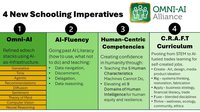Walk through any store, and you find holiday displays, promoting the purchase of giant inflatables or the latest Tik-Tok trend. The vibrant red and green decorations along with the jingle bell music promise a respite from the daily grind. At home, the Christmas movies are showing on all streaming platforms, offering an escape to a small town with a fairytale experience. Meanwhile, according to Feeding America, 1 in 5 children in our country do not have enough food to eat.
What does this startling statistic mean for our students? It means that this season heralded as “the most wonderful time of the year” may actually be harrowing. Many students do not enjoy their two weeks or more off of school because they may go to bed hungry most nights. Sure, there are church giveaways for Christmas dinner, but what about the other days?
What many teachers interpret as holiday excitement may actually be out-of-school anxiety. According to the Bureau of Labor Statistics, 67% of families have two-working parents. There are 7.3 million single mothers in our country. So…who’s watching the children?
Let’s face it, this season of bliss may actually be confusing for our children, especially as they get a bit older and understand the harsh realities of life.
How can we as caring adults who are present in our students’ lives before and after winter break help them through the holidays? Here are a few ideas:
Reframe expectations. – Remind students, and families, the real reason for the season – gratitude, generosity, and friendship – not scoring the latest Nikes. Read stories and share films that celebrate strength of character and personal transformation.
Be Honest. – Regular routine and school meals offer security. Talk with your students, families, and fellow educators about the fact that time away from school may be worrisome.
Share Resources. – Whether you provide food baskets, winter coats, or non-profit contact info, give families support. Perhaps, even a suggested daily schedule would be helpful for younger families, be sure to include wake-up, bedtime and family activities.
Offer Winter Camp. – Whether it’s one day or five days, host a Winter Camp at your school, church or community center where students can have fun, eat healthy food, and have a predictable routine.
Remember, educators are community leaders. Take your place and lead with courage.
Stories to share:
The Mitten by Jan Brett
The Snowy Day by Ezra Jack Keats
The Little Matchgirl by Hans Christian Andersen
The Lion, the Witch and the Wardrobe by C.S. Lewis
The Long Winter by Laura Ingalls Wilder
Films to share:
Happy Feet (2006)
Jack Frost (1998)
Balto (1995)
About the author
About the author

Tamara Fyke is an educator and social entrepreneur with a passion for kids, families, and urban communities. She is the creator and author of Love In A Big World, which provides mental health, SEL, and wellness curriculum and content. During quarantine, Tamara created MusiCity Kids, an online educational show for kids ages 6-12 that addresses health, movement, character development, STEAM, and more.











